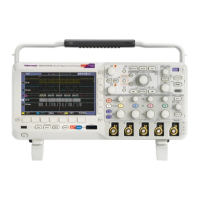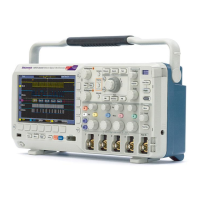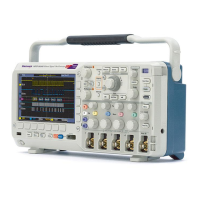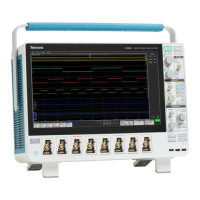Commands Listed in Alphabetical Order
Related Commands
*CLS, DESE, *ES
R?, EVENT?, EVMsg?, *SRE, *STB?
Arguments
<NR1> specifies the binary bits of the ESER according to this value, which ranges
from 0 through 255.
The power-on default for the ESER is 0 if *PSC is 1. If *PSC is 0, the ESER
maintains the previous power cycle value through the current power cycle.
NOTE. Setting the DESER and the ESER to the same values allows only those
codes to be e ntered into the Event Queue and summarized on the ESB bit (bit 5) of
the Status Byte Register. Use the DESE command to set the DESER.
Examples
*ESE 2 09 sets the ESER to binary 11010001, w hich enables the PON, URQ,
EXE, and OPC bits.
*ESE? might return 186, showing that the ESER contains the binary value
10111010.
*ESR? (Query Only)
Returns the contents of the Standard Event Status Register (SESR). *ESR? also
clears the SESR (reading the SESR clears it). For a detailed discussion on how
to use registers, see Registers.
Group
Status and Error
Syntax
*ESR?
Related Commands
ALLEv?, *CLS, DESE, *ESE, EVENT?, EVMsg?, *SRE, *STB?
Examples
*ESR? might return 213, showing that the SESR contains the binary value
11010101.
ETHERnet:DHCPbootp
Sets or returns the network initializa tion search for a DHCP/BOOTP server.
Group
Ethernet
MSO2000B, DPO2000B, MSO2000 and DPO2000 Series Oscilloscopes Programmer Manual 2-147

